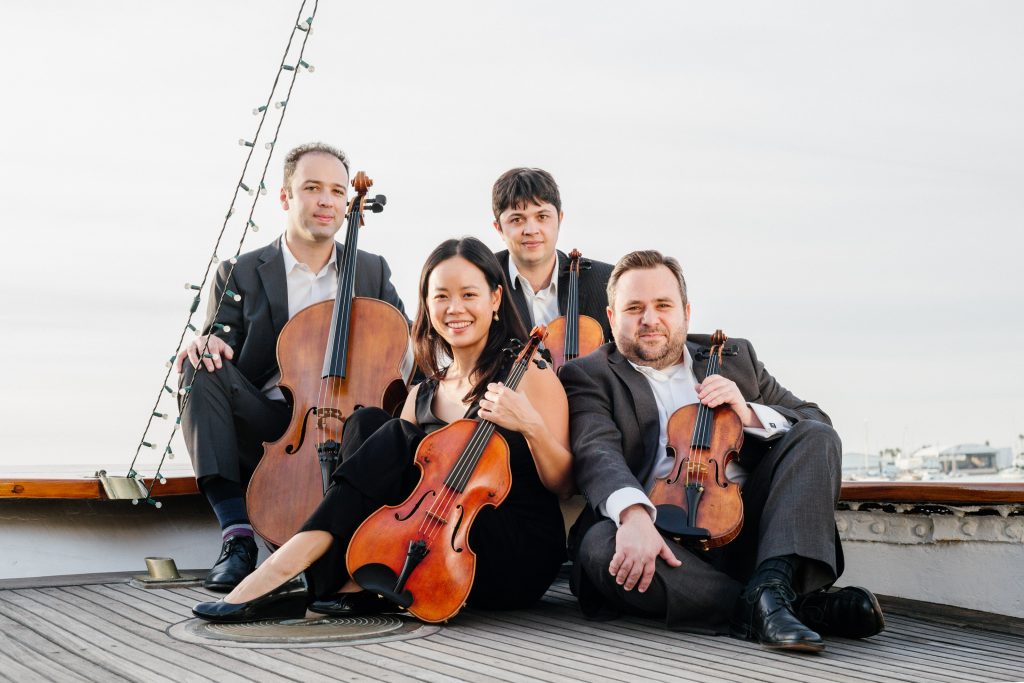Hausmann Quartet and Soprano Ann Moss Give Spectacular Account of John Harbison’s ‘The Rewaking’ in Sunday’s Haydn Voyages Concert

Hausmann Quartet: (from left) Alex Greenbaum, Angela Choong, Isaac Allen, Bram Goldstein [photo (c.) Samantha Zauscher]
But once they dispensed with their polished, affectionate account of this light-hearted, at times “chirpy” quartet, they applied their interpretive prowess to probing, formidable contemporary works by John Howell Morrison and John Harbison. For his 1991 The Rewaking, Harbison set four late William Carlos Williams’ poems, a commission for the Juilliard String Quartet and soprano Benita Valente.
The Rewaking is a work of astonishing power and depth, and I am happy to report that Hausmann and soprano Ann Moss gave it an electric performance. For the strings, Harbison provided serious, deftly interwoven counterpoint to set the mood of Williams’ dark, elliptical poetry. As a violist who played regularly in string quartets, Harbison clearly demonstrates an insider’s understanding of quartet structure, and his handiwork is a marvel to behold. Although his modernist harmonic language only flirts with atonality, it is sufficiently unpredictable to rivet a serious listener’s avid attention. Hausmann’s command of this daunting idiom proved nonpareil—some of the finest playing I have heard from them in the several years I have attended their Haydn Voyages series.
To the soprano, Harbison gave haunting melismas that exploded key words from their poetic context, especially in the opening movement “The Woodthrush.” In “The Lady Speaks,” the third movement, the soprano’s wild lines parallel the raging storm portrayed by the strings, and Ann Moss’s bold, clear, brightly focused soprano communicated their startling quality with fierce conviction. Throughout the piece her lucid diction and well-supported tone gave clear shape to Harbison’s asymmetrical phrasing.
The work’s final movement repeats the quartet’s title, “The Rewaking.” Although it opens with the strings intoning earnest, hymn-like progressions, neither Williams nor Harbison offer facile spiritual comfort. If the strings appear to evoke calm or resolution, the soprano shouts out Williams’ phrase, “But not YET!” And quickly Harbison returns to his skeptic’s angst-filled counterpoint.
“Hard Weather Makes Good Wood,” a single movement recent work by John Howell Morrison, also takes the listener on a journey through a storm banked on either side by calm sections in which the lower three strings strum an ostinato of rhythmic chordal patterns while the first violin offers terse melodic riffs. I am afraid the strength of Harbison’s stormy music has erased my clear recollection of Morrison’s crucial storm, but my notes record a flurry of bowed cacophony that either preceded his storm or was part of it. Morrison calls for an unusual number of solo themes from the viola, which Angela Choong played with her customary flair. Cellist Alex Greenbaum offered assured accounts of the composer’s occasional agitated cello solo forays, and violinists Isaac Allen and Bram Goldstein displayed their well-balanced, poised playing at every turn.
This concert by the Hausmann Quartet was presented online from the Maritime Museum of San Diego on Sunday, November 15, 2020.

Ken Herman, a classically trained pianist and organist, has covered music for the San Diego Union, the Los Angeles Times’ San Diego Edition, and for sandiego.com. He has won numerous awards, including first place for Live Performance and Opera Reviews in the 2017, the 2018, and the 2019 Excellence in Journalism Awards competition held by the San Diego Press Club. A Chicago native, he came to San Diego to pursue a graduate degree and stayed.Read more…

Wonderful music-making. Especially enjoyed hearing Ann Moss again.